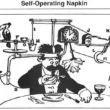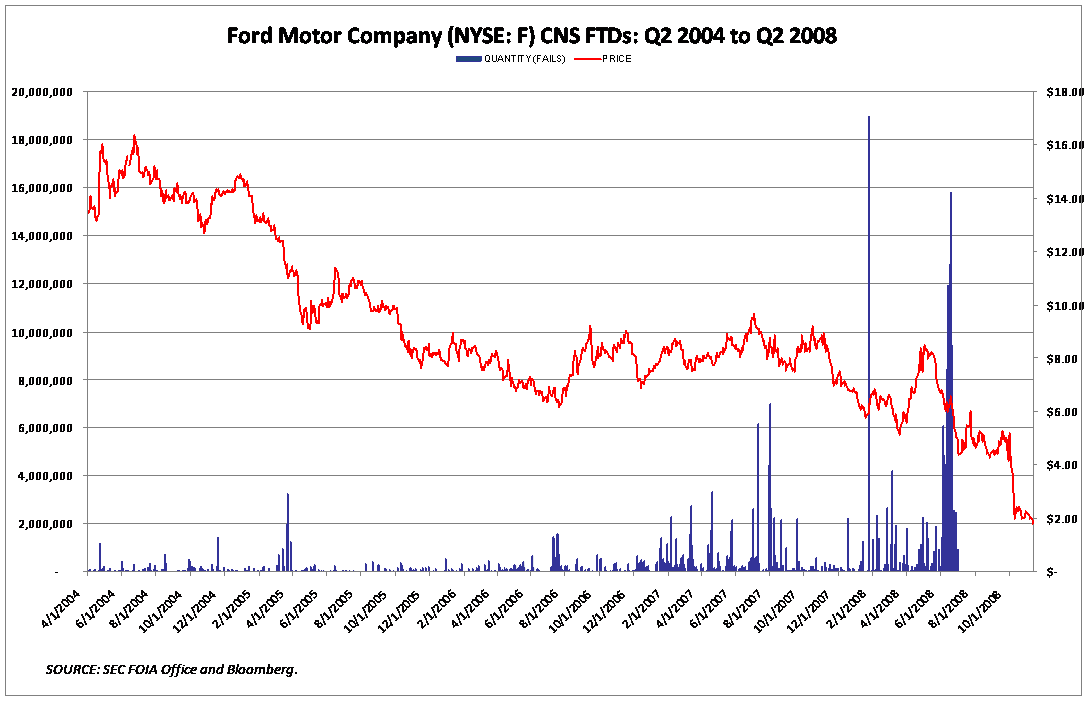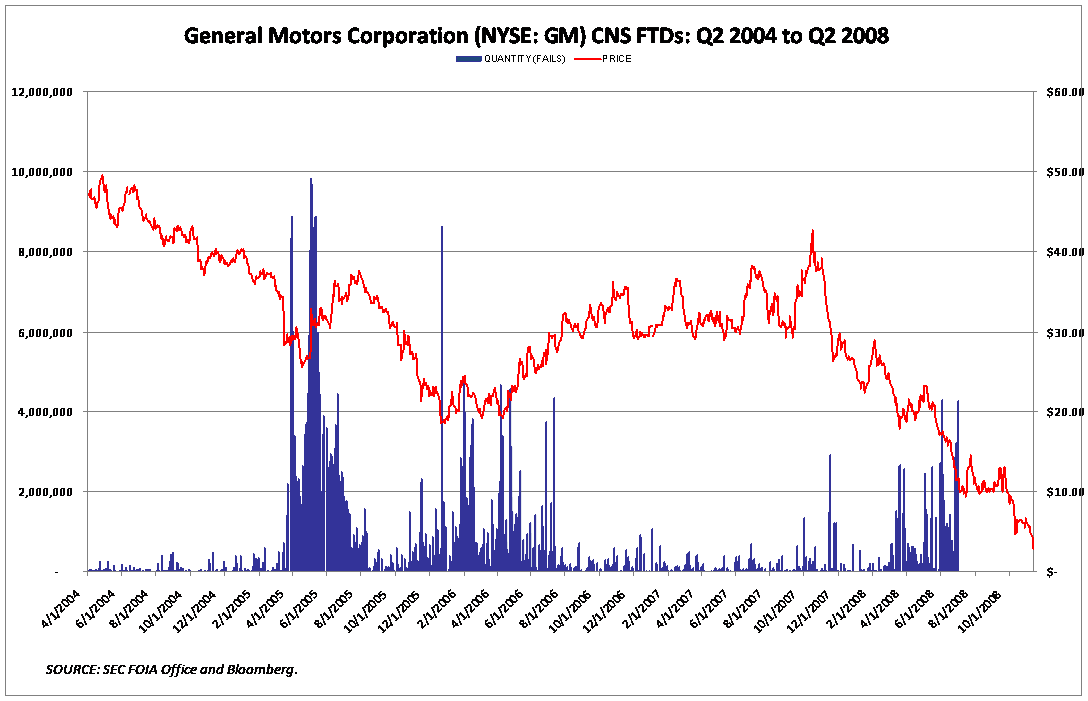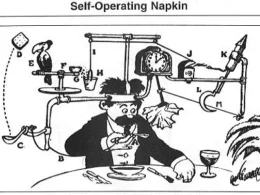Given that a couple million American jobs rely directly or indirectly upon the survival of Ford and GM, and given that they are running out of capital and are standing on the steps of Congress with tin cups in their hands, wouldn’t it be nice if we had a functioning capital market that was determining the true market clearing price of their equity?
Once again, the following are just the failures in the CNS system, which is some unknown (but small, I believe) fraction of the total:
I guess these car guys don’t have “the juice” with the SEC that their Wall Street counterparties have. Perhaps that is because fewer staff within the SEC dream of getting jobs in Detroit than in Manhattan.
If this article concerns you, and you wish to help, then:
1) email it to a dozen friends;
2) go here for additional suggestions: “So You Say You Want a Revolution?“











These graphs are astonishing!
The more I SEE, the more strongly does it appear that Congress intentionally made hedge funds UNREGULATED with the full knowledge that this was a “Quid Pro Quo” arrangement to obtain financial support for the political parties.
As long as Congress continues to feel warm and fuzzy about this arrangement, I am not sure what can be done.
Additionally, some people are reporting that the Mafia and Drug Cartels are using hedge funds to maximize their bank accounts. If this is true, then WHEN will the terrorist figure out they can make easy money the same to finance their terrorist acts and / or decide to destroy Western Economies for Economic Terrorism?
How much have we spent so far add the Big 3, cities and 700B Obama has planned….and WOW !
http://cosmos.bcst.yahoo.com/up/player/popup/?rn=3906861&cl=10925086&ch=4226720&src=news
The ones who should be watching out for us are so gone that they are like crack heads and only look after the next fix of payoff graft!
The only thing that can is if we can get rid of them all…fat chance so far.
I know people who spent most of their adult life working for F or GM. Grew up simple, went to war, and played by the rules. Never became rich, just went to work everyday, paid their bills, paid their taxes, raised families. Built cars, bought homes, put kids through college. In other words, created something and contributed to society. Now they are looking at having their retirement cut by 60%, and spending their twilight worrying about bills and medical. Their only mistake was trusting in the system. We have failed them at every turn.
Hedges build nothing. They create nothing. They contribute nothing. All they do is destroy. Our country has witnessed a long long, movement of wealth and assets from the majority to the minority.
Shame on them, those who protect them, and those who don’t try and right this wrong.
http://www.euromoney.com/Article/2060049/US-equity-marketFails-to-deliver-The-naked-truth.html
Also, don’t forget that the Canadian Depository for Securities, Euroclear, Clearstream and various prime brokerages and foreign banks all have accounts at the Depository Trust.
Any fails to deliver can be hidden in any of these depositories and clearing houses.
Istandup, scrolldown to the picture of NYSE Grasso.
http://www.narconews.com/narcodollars1.html
Hey Patrick…Maybe now there might be a cabinate post in Washington for you?
You are rather far up the learning curve on this one.
I would, however keep my daytime job.
Thanks for all the effort, and I hope that if things don’t improve soon, that at least, I am lucky enough to find refuge under the same bridge you and my other favorite person Ming the Merciless are under.
The sad part is that the executives at these companies seem to have no clue as to how the equity markets work and the effect of naked short selling on their company directly and indirectly.
More than even investors, executives at public companies should know what is going on, how the markets work and do something about naked short selling in their securities like Patrick Byrne has been doing.
It’s really their fiduciary duty to their investors and their board of directors to know about this and at the minimum inform the investors and their board about this.
In the case of F and GM and other companies that eventually went under, naked short selling chokes off the companies from being able to raise equity capital, basically sealing their fate.
But not a word is heard from the executives as it seems they believe what Wall Street tells them, so they do as they’re told instead of what they should do and should have done a long time ago. Ignorance has made them beholden to Wall Street, something like the “kidnapper syndrome” – where the kidnap victim identifies with the kidnapper and willingly obeys him.
This type of Board Room Ignorance about Wall Street kills companies and investors because the companies then don’t put up a fight – the entire enterprise is thus exposed to Naked Short Sellers like a body without white blood cells.
Companies are afraid of being made examples of, so they stay quiet on it to avoid being naked shorted into oblivion.
http://www.foreignpolicy.com/story/cms.php?story_id=4563
Stephen Cohen’s firm (an IP lookup identified them) once made a post on wikipedia explaining a common way big clients do a short with no risk. It was almost immediately taken down.
The technique is called a swap. They keep their money and their stock at their prime brokerage. They agree to pay the prime brokerage interest on a million dollars that doesn’t exist and the brokerage agrees to give them the upside on a million dollars worth of stock they don’t own.
For the cost of interest, they’ve completely insured their short bet from loss.
It’s off balance sheet because the two sides of the swap are supposed to net to zero.
Now, on the other side of the trade, the prime brokerage gets the collateral on the short, the interest payment and the risk that the stock might go up. Because of this, prime brokerages are heavily incented to allow fails to keep the prices of victim stocks down. When another customer buys the victim company’s shares, they have a strong incentive to “desk” the trade (take the customer’s money and not buy anything).
How many of these fails (do you think) originated with a hedge fun run by a man named Paulson, Chanos or any other name congress had before them (well, in front of them, cause I think they all got reach arounds while congress was digging up some pocket change).
Everything our Gov touches turns to CHIT…Imagine your healthcare controlled by Gov ?
http://news.yahoo.com/s/ap/20081203/ap_on_go_co/financial_meltdown
AP
Auditors fault Treasury oversight of bailout funds
*
Buzz Up
* Send
o Email
o IM
* Share
o Digg
o Facebook
o Newsvine
o del.icio.us
o Reddit
o StumbleUpon
o Technorati
o Yahoo! Bookmarks
* Print
By JIM KUHNHENN, Associated Press Writer Jim Kuhnhenn, Associated Press Writer – 52 mins ago
Featured Topics:
* Barack Obama
* Presidential Transition
Paulson’s advice for China Play Video Reuters – Paulson’s advice for China
* Financial Crisis Slideshow: Financial Crisis
* Following the Bailout Money Trail Play Video Video: Following the Bailout Money Trail ABC News
* Layoffs Looming at BofA/Merrill Play Video Video: Layoffs Looming at BofA/Merrill CNBC
Trader David O’Day works on the floor of the New York Stock Exchange, Tuesday, AP – Trader David O’Day works on the floor of the New York Stock Exchange, Tuesday, Dec. 2, 2008. (AP Photo/Richard …
WASHINGTON – The government must toughen its monitoring of the $700 billion financial bailout to ensure that banking institutions limit their top executives’ pay and comply with other restrictions, federal auditors said Tuesday in the first comprehensive review of the rescue package.
The Treasury Department has no mechanism in place to track how institutions are using $150 billion in taxpayer money that the government injected into the banking system as of last month, the Government Accountability Office concluded in its report to Congress.
The auditors acknowledged that the program, created Oct. 3 to help stabilize a rapidly faltering banking system, was less than 60 days old and has been adjusting to an evolving mission.
But the 72-page report was bound to feed congressional concern that banks and other institutions are not being properly monitored and are not using the money to increase lending.
Meanwhile, the Federal Reserve said it was extending the life of lending programs aimed at smashing through credit clogs and restoring stability to financial markets. The Fed said the programs, originally slated to last through Jan. 30, would be extended through April 30 “in light of continuing strains in financial markets.”
On Wall Street, the Dow Jones industrials rose 270 points, making at least a dent in Monday’s huge drop of nearly 680.
As for the bailout plan, auditors specifically cited weaknesses in determining whether institutions that received bailout money are complying with limitations on executive compensation and dividend payments. For instance, some top executives at institutions that receive rescue funds must repay any incentives or bonus pay that was based on inaccurate financial statements.
“Treasury has not yet determined how it will monitor compliance with this or other requirements such as limitations on dividend payments and stock repurchases,” the report states.
Auditors recommended that Treasury work with government bank regulators to determine whether the activities of financial institutions that receive the money are meeting their purpose.
In a response to the GAO, Neel Kashkari, who heads the department’s Office of Financial Stability, said the agency was developing its own compliance program and indicated that it disagreed with the need to work with regulators.
“The GAO’s discouraging report makes clear that the Treasury Department’s implementation of the (rescue plan) is insufficiently transparent and is not accountable to American taxpayers,” said House Speaker Nancy Pelosi, D-Calif.
So far, the government has pledged to pour $250 billion into banks in return for partial ownership. It also has agreed to provide $40 billion to troubled insurer American International Group. In addition, $20 billion of the money was invested in Citigroup and another $20 billion went to the Federal Reserve to help ease credit stresses.
Initially, Treasury Secretary Henry Paulson said the money would be used to buy distressed mortgage-related securities from banks. His switch in strategy drew criticism from lawmakers as a confusing mix of messages to the public and investors.
Responding to criticism, federal regulators urged banks to use the money they receive from the bailout to bolster lending. The advice, however, isn’t legally binding.
The GAO is one of three watchdogs that Congress has assigned to monitor the dispensation of the extraordinary $700 billion financial rescue package, known as the Troubled Asset Relief Program, or TARP. A congressional oversight panel is scheduled to issue its report on Dec. 10. In addition, Congress created an office of inspector general to oversee the program, but the appointment to the post has been anonymously blocked in the Senate.
Senate Finance Committee chairman Max Baucus used the GAO report as an opportunity to demand the confirmation of veteran federal prosecutor Neil M. Barofsky to the inspector general’s job. An anonymous Republican senator has placed a hold on his confirmation.
“This report proves the immediate need for oversight of the taxpayer dollars being expended right now as part of TARP,” Baucus said in a statement. “Because of one senator’s anonymous block on this nomination, three weeks have been lost — a key element of the TARP oversight program is not in place.”
Senators are allowed to single-handedly block nominations. They have six days during which Congress is in session to reveal their holds. But those six days have not elapsed since the hold on Barofsky occurred.
Of the senators who attended Barofsky’s confirmation hearing on Nov. 19, only Sen. Jim Bunning, R-Ky., who opposed the bailout plan itself, voiced reservations about the nomination.
“Ultimately, I believe Mr. Barofsky, with his impressive legal skills, can serve the public far better in the Southern District of New York, where he can continue to prosecute mortgage fraud,” Bunning said at the time.
Bunning spokesman Mike Reynard would not comment on whether Bunning had placed the hold. He noted that the senator has co-sponsored legislation that would give the inspector general greater oversight authority.
___
AP Economics Writer Jeannine Aversa contributed to this article.
It’s not my first time to pay a quick visit this web site, i am visiting this web site dailly and obtain nice information from here every day.|